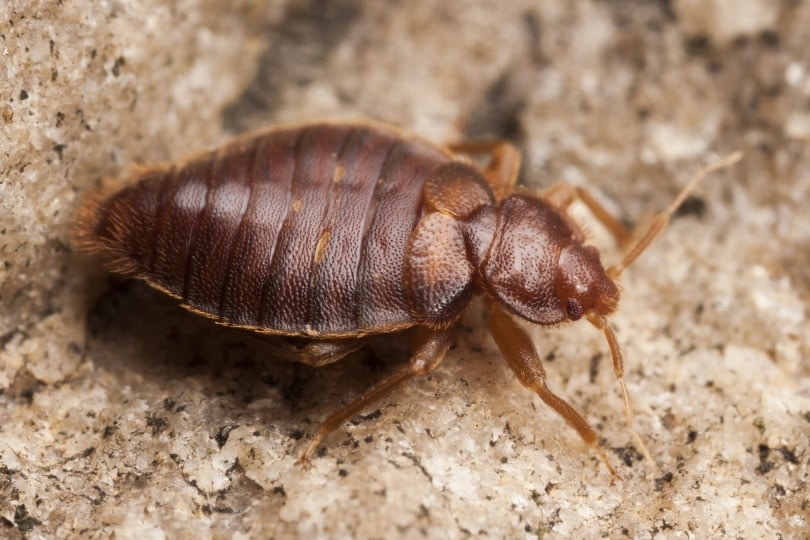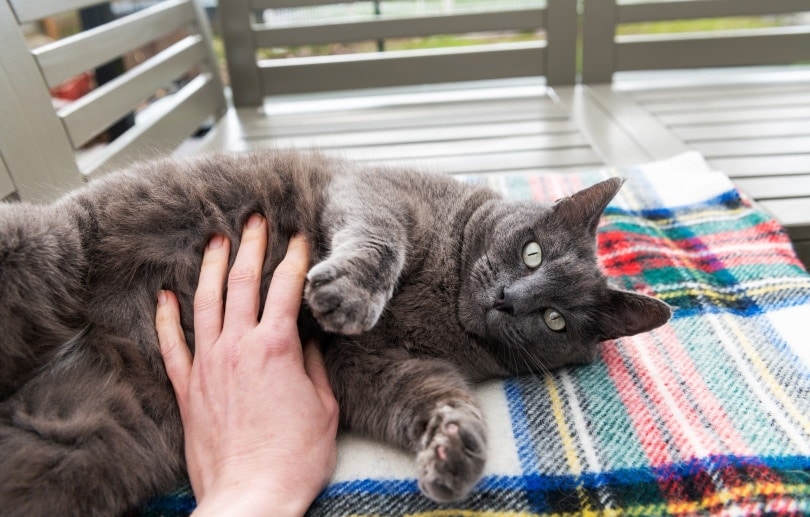Do Bed Bugs Bite Cats? Science-Based Facts & FAQ

Updated on

Ugh, bed bugs. They’re tiny, they bite, and they’re incredibly difficult to get rid of once they’ve infested your home. And unfortunately for your furry friends like cats and dogs, bed bugs can bite them as well.
Most bed bugs don’t carry additional parasites like fleas and mites do; however, their bites can cause serious itching, rashes, and skin irritation for you and your cats. Keep reading to learn more about how bed bugs can bother your cat and how to get rid of them.
Cats and Bed Bugs

Bed bugs are pesky little creatures that feed on the blood of warm-blooded creatures. While they’re typically known for feasting on people, they’ll happily feed on your pets too.
Cats are convenient creatures for bed bugs to hop on and hitch a ride because they move everywhere in your house. Cats like to nestle on your couch, armchair, bed, and in other dark, soft places. These spots are also ideal for bed bugs.
The good news is that bed bugs don’t typically spread diseases when they bite. That being said, their bites can still cause pain and discomfort.
How Do You Know if Bed Bugs Are Bothering Your Cat?
Unfortunately, bed bugs typically feed at night when it’s too dark to see them. They attach to their host, feed for a few minutes, then leave. This makes it very difficult to actually spot a bed bug on your cat. Instead, you’ll need to look for other signs. These include:
- Shed exoskeletons of the bugs (they’re translucent)
- Tiny black spots on your bedding (which are bug droppings)
- Red blood stains on your bedsheets
- Welts on your skin or your cat’s skin
If you notice any of these signs or see your cat itching more frequently, you’ll want to investigate more closely to see if bed bugs are the culprit.
Once they’re in your home, bed bugs can reproduce and become a full-blown infestation rather quickly. Females lay up to five eggs per day, so you can see how two bed bugs can quickly become 20, then 50, then more.
Getting Rid of Bed Bugs

Eliminating bed bugs from your home is a time-consuming and costly process. To completely eradicate them, you’ll likely need to hire a professional.
Bed bugs act like little hitchhikers and travel from place to place in your luggage, on your clothing, and even on your pets. Once they’re in your home, they can easily move from the bedroom to other rooms with comfortable hiding spots, such as your living room. A professional will be able to determine which areas of your home have bed bug infestations.
Once you bring in a professional exterminator, they’ll advise you to clean any fabric materials, such as your bedding, with hot, soapy water. They’ll encase the mattress in bug-proof covers. Then every surrounding surface will be cleaned. The insecticides used can be harmful to your pets, so you’ll need to keep your cats and dogs away while your home is being treated.
Don’t forget to include any bedding your cat uses in the cleaning process. Ask your veterinarian what the best procedure to use is to reduce the risk to your pet.
 Other Common Causes of Skin Irritation in Cats
Other Common Causes of Skin Irritation in Cats
Bed bugs aren’t the only thing that can cause red welts or skin irritation in cats. Insect bites can cause severe itching and redness. These insects might bite your cat, especially if your cat is outdoors:
- Flies
- Ants
- Ticks
- Fleas
- Mites
- Bees
- Wasps
- Hornets
- Mosquitoes
Other signs of skin irritation that may or may not be caused by insect bites include hair loss, scabs, dry skin, or sores. Cats often have sensitive skin and are prone to allergies. Some causes of skin problems in cats include:
- Fungal or bacterial infection
- Over-grooming
- Autoimmune diseases
- Ringworm
- Food allergies
- Inflammation
- Nutritional imbalances
- Obesity
- Thyroid disorders
Typically, your veterinarian can diagnose the problem causing your cat’s skin problems by looking at it or taking a small sample for testing. Depending on the cause of the problem, treatments can range from medication, a change in diet, removal of allergens from the home, or other procedures.

Final Thoughts
If you think you have a bed bug infestation, don’t wait. Call in a professional right away. It’s also a good idea to contact your veterinarian to see what the best approach is for eliminating them from your cat’s lounging areas. Finally, if your cat is itching excessively or has red welts on their body, it might be bed bugs or another common skin irritant. It’s best to have your veterinarian take a look.
Featured Image Credit: Pavel Krasensky, Shutterstyock











